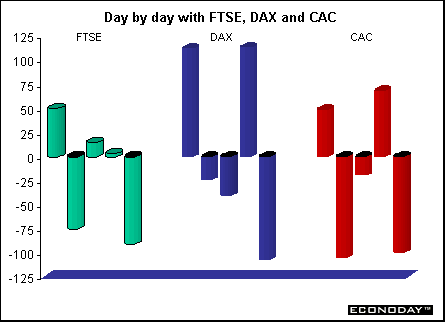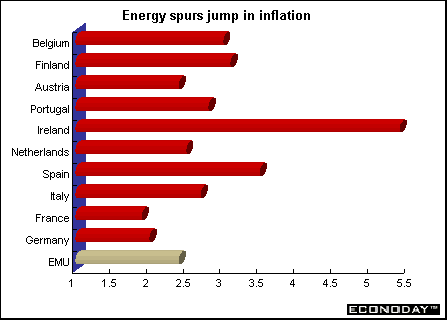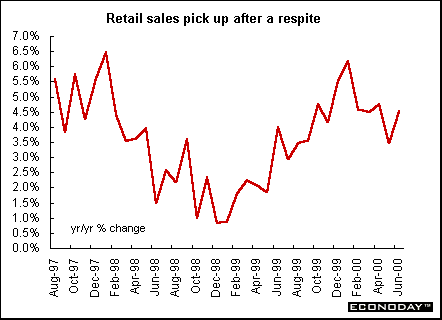| Previous Articles |
|
Interest
rates remain the same in Japan and EMU
Britain
and Europe The FTSE failed to benefit from Greenspan's testimony earlier in the week. As the Dow, Nasdaq, Paris CAC and Frankfurt DAX rose on Thursday, the British blue chip index barely yawned. The FTSE 100 ended the week at 6378.40, down 97 points or 1.5 percent.
The Frankfurt DAX continued to gain on the week even though investors were disappointed with Ifo survey results that showed an ebbing of business exuberance. However, the survey was taken prior to passage of tax reform measures by the German upper house. The markets responded only with subdued enthusiasm. The DAX rose 54.88 points or 0.75 percent to end the week at 7373.26, despite closing down three days of the week when investors decided to take profits. In Paris, the CAC slipped 106.24 points or 1.62 percent to end the week at 6464.12 for much of the same mid-summer reasons. Asia
Hong Kong's Hang Seng, on the other hand, closed out the week at its highest level since March 29. The reason emanated from the United States. The Hang Seng celebrated the relatively tame U.S. inflation data and the flow of strong earnings reports. The index briefly climbed above 18,000 on Friday, but pared some of the gains to end the week at 17,920.86, up 334.41 points or 1.90 percent. Investors interpreted Greenspan's remarks to mean that an interest rate rise next month was now unlikely and piled into interest rate sensitive banking and property stocks.
Currencies
The euro fell Tuesday after the Organization for Economic Cooperation and Development (OECD), in its regular report on financial market trends, implicitly criticized the European Central Bank for sending policy signals that confused the market and that did not contribute to a strong euro. The report also said that massive capital flows out of the EMU into the U.S. also played a role in the euro's slide against the dollar. And the euro may come under pressure in coming weeks on speculation that mergers and acquisition activity will require companies to convert currencies to finance overseas investments.
The European Central Bank meeting on Thursday was an afterthought in many traders' minds as most expected the central bank to keep rates steady throughout the summer as ECB officials have often signaled. The yen fell to a six week low against the dollar after the Bank of Japan left interest rates unchanged Monday, citing concerns that the economy might not be ready for higher borrowing costs after Japan's largest department store failed last week. But the bank also said that deflation threats are receding as the economy recovers, suggesting a rate increase is on the horizon. Still, policy makers signaled a desire to gauge whether the bankruptcy would hurt investor confidence. Japan cut its target for overnight inter-bank lending to almost zero percent in March 1999 as an emergency measure to stoke economic growth. The move has kept returns on yen denominated deposits far below those of other major economies.
Masaru Hayami, the central bank's governor, triggered expectations that an interest rate rise was imminent. Hayami said that the low rate policy has delayed reform at debt laden companies and the banks that lend to them, encouraged government spending, and hurt those who rely on fixed income. Bank officials are also concerned that delaying a rate increase now could force them to move more aggressively later. The Group of Seven heads of state issued their economic statement after the first day of their three day meeting, saying Japan still needs to pursue domestic demand policies to push the economy towards a sustainable recovery. This is similar to previous statements and had little impact, although it does suggest continued pressure is being exerted on Japan to maintain stimulative monetary and fiscal policy. Indicator
scoreboard
Germany - June wholesale prices were up 0.3 percent on the month and 5.5 percent on the year. Excluding combustibles and motor fuels wholesale prices were up 2.5 percent on the year. Combustibles (crude oil, gas and coal) and motor fuels were up 4.0 percent on the month and 39.7 percent on the year. June's Ifo Institute's west German business sentiment index declined to 100.4 after having reached a high 102.0 reading in May. The overall index's drop was due to deterioration in both sentiment on current conditions and on business expectations. The Ifo current conditions index for west Germany fell to 94.3 in June from 95.4 in May, while the business expectations index fell to 106.6 from 108.8. In east Germany, overall business sentiment also declined in June, down to 105.8 from 107.5 in May. In east Germany the current conditions index decreased to 125.0 in June after 128.0 in May, while business expectations fell to 87.6 from 88.3.
May manufacturing orders data were revised up to 2.6 percent on the month versus the 1.9 percent increase initially reported. Both domestic and foreign orders were revised up. Domestic orders were up 2.4 percent on the month and foreign orders rose 2.8 percent. Seasonally adjusted manufacturing orders were revised up because of several legal holidays, which normally fell in May occurred in June this year. France - May merchandise trade surplus widened sharply to E1.885 billion. Exports rose 9.3 percent while imports rose 2.7 percent on the month. May seasonally and workday adjusted manufacturing output rose 0.9 percent. Activity improved in all manufacturing sectors. Gains were led by the consumer goods sector where production was up 2.3 percent. Production in the auto sector was up 1.1 percent, capital goods output rose 1.0 percent and was up 0.3 percent in the semi-finished goods sector. Spain - May workday adjusted industrial production jumped 7.7 percent when compared with last year. Strong gains were recorded in the capital goods sector, up 16.6 percent and in the intermediate goods sector, up 8.0 percent on the year. Consumer goods rose 3.8 percent in May from May 1999. Britain - June seasonally adjusted retail sales volumes rose 0.7 percent on the month and were up 4.5 percent when compared with a year earlier. In the three months April to June, the volume of sales was 0.3 percent higher than in the previous three months and up 4.3 percent from the same period a year ago. The unadjusted average weekly value of retail sales rose 2.8 percent when compared with June 1999.
Second quarter gross domestic product rose 0.9 percent and 3.1 percent when compared with last year. On an annualized basis, growth is now running above trend at 3.6 percent.
Asia
April to June seasonally adjusted unemployment rate fell slightly to an average of 5 percent. Construction, manufacturing and trade related companies saw the biggest declines in unemployment offsetting rising unemployment among business services providers. Australia - Second quarter prices for manufactured goods rose 1.9 percent and 7.3 percent when compared with a year ago. Much of the increase came from higher gasoline prices. Excluding gasoline, prices rose 4.7 percent from a year ago - the biggest increase since the first quarter of 1990. Second quarter export prices rose 6.2 percent, the biggest quarterly increase since the second quarter of 1989. The jump in export prices is in line with expectations of generally higher commodities prices, a narrowing in the country's current-account deficit and a switch from domestic demand to export led economic growth. Americas
May manufacturers' shipments rebounded by 3.4 percent led by recoveries in the motor vehicle and refined petroleum and coal industries. Manufacturers' shipments increased in 18 of the 22 major groups, representing 94.9 percent of the total value of shipments. Excluding the automotive sector, manufacturers' shipments increased 3.0 percent. Unfilled orders continued to decline in May, but inventories increased for the sixteenth consecutive month. Manufacturers' backlog of unfilled orders decreased 1.3 percent. Manufacturers' inventories rose 1.8 percent, the sixteenth consecutive monthly increase. Manufacturers' inventories have grown 6.0 percent since the beginning of the year and were 12.4 percent higher than the May 1999 level. The inventory to shipments ratio fell back slightly to 1.31 from 1.33 in April. May retail sales climbed 0.4 percent driven by the automotive sector. Most other sectors also posted advances, but only food stores and furniture stores suffered declining sales. When prices are held constant, retail sales remained unchanged from the previous month. Several factors have contributed to the recent retail sales volatility. A warmer than usual winter and cooler than normal spring have shifted consumers' spending patterns. Additional volatility has been caused by large swings in gasoline prices.
BOTTOM
LINE Once the summer vacation season is over, overseas market players look for interest rate increases in Japan and the EMU. This will narrow the interest rate spread with the United States somewhat, making overseas investments more attractive. The higher interest rates will also provide investors with more options. Looking
Ahead: July 24 to July 31, 2000
|
|||||||||||||||||||||||||||||||||||||||||||||||||||||||||||||||||||||||||||||||||||||||||||||||||||||||||||||||||||||||||||||||||||||||||||||||||||||||||||||||||||||||||||||||||||||||||||||||||||||||||||||||||||||










